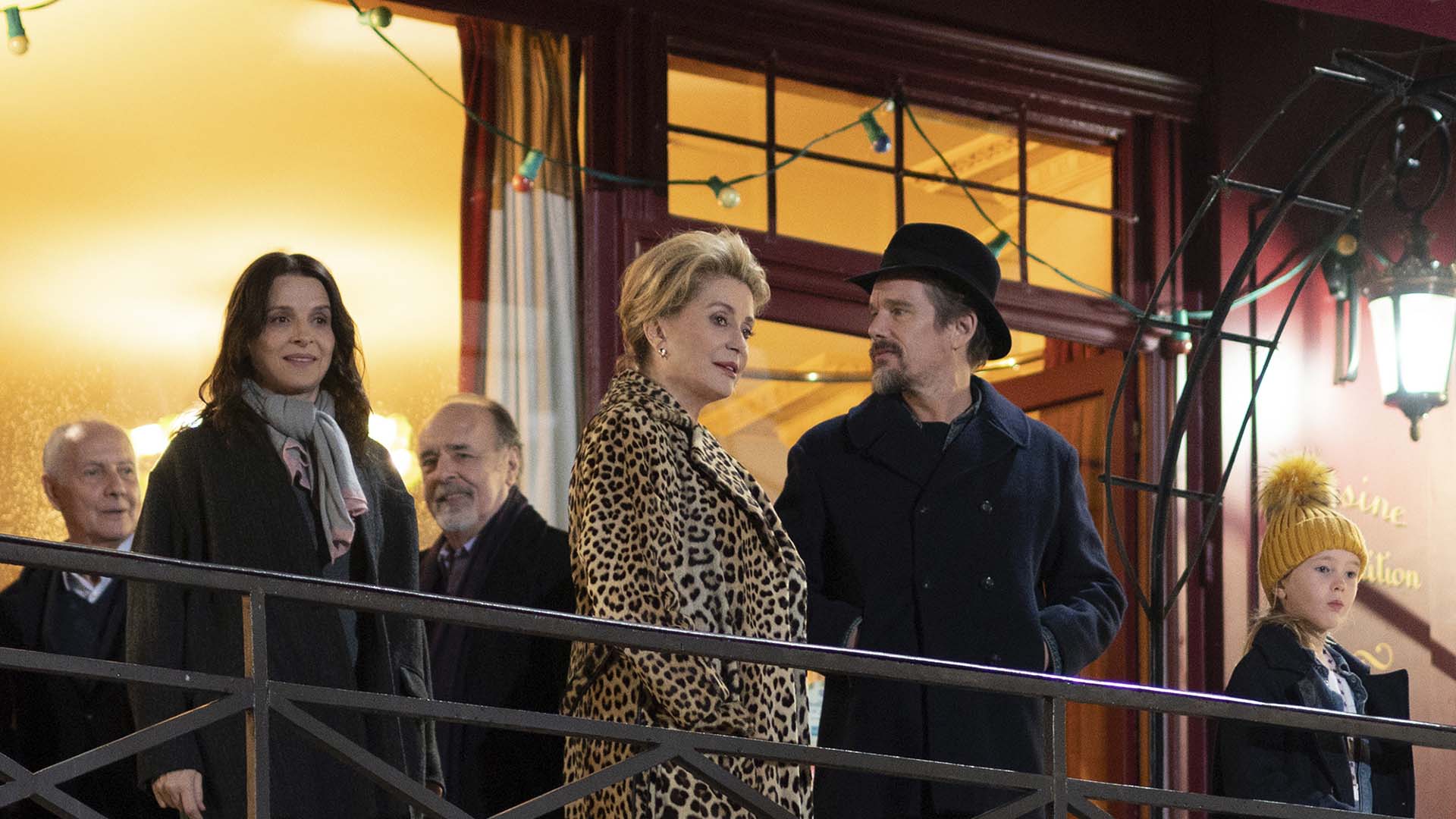The Truth
After winning the Palme d'Or for 'Shoplifters', Hirokazu Kore-eda returns with a characteristically perceptive family drama set in France.
Overview
UPDATE, January 18, 2021: The Truth is available to stream via Stan, Binge, Foxtel Now, Google Play and YouTube Movies.

What does an acclaimed Japanese filmmaker do after spending his career exploring complicated family dynamics in his homeland, then winning the Cannes Film Festival's top prize for his last effort? If he's Hirokazu Kore-eda, he goes to France. Boiling The Truth down to 'Kore-eda in Paris' is simplistic, and yet it fits perfectly — and that's by no means a bad thing. Neither is dubbing this layered film Kore-eda ode's to French cinema. While the writer/director calls on many of the familiar trademarks that've made his Japanese-language features such hits, he sets them in France, filters them through French cinematic sensibilities, and deploys them in French and English. His first non-Japanese movie mightn't initially seem like the natural successor to Shoplifters, but it actually suits that role nicely. The intricate, intimate family interplay that Kore-eda has spent his filmography studying is universal, after all.
When beloved acting veteran Fabienne Dangeville (Catherine Deneuve) welcomes her daughter Lumir (Juliette Binoche), son-in-law Hank (Ethan Hawke) and granddaughter Charlotte (Clémentine Grenier) for a rare visit to her sprawling home, there's much to unpack — for this loving but bickering brood, and for audiences. The family reunion is in celebration of Fabienne's just-published memoir, which Lumir hasn't been given a copy of before she arrives, but has firm views on once she reads it. "I can't find any truth in here!" she comments angrily. "I'm an actress — I won't tell the unvarnished truth," is Fabienne's haughty justification. As well as throwing around the titular term liberally, The Truth follows the pair's attempts to sift through a lifetime of baggage, with the book's many embellishments revealing just how differently they each view Lumir's childhood.
Also an actor, Hank watches on, hampered by his inability to speak French. Meanwhile, Charlotte obsesses over grandmother's giant pet turtle, who has the same name as her grandfather. But the fallout from Fabienne's memoir just keeps coming. Her long-term personal assistant, Luc (Alain Libolt), quits because he isn't even mentioned in the book, throwing the household into disarray. That leaves Lumir, a screenwriter, to step in, accompanying her mother as she shoots her latest big-screen role. It's in a sci-fi film called Memories of My Mother, where Fabienne's character grapples with an absent mum — all as Fabienne herself gets envious about her applauded young co-star (Manon Clavel).
Not only crafting a film about a strained mother-daughter relationship, but also featuring a film within the film about the same topic, Kore-eda threatens to steer The Truth into obvious territory. But he's always been talented at exposing the complexity lingering beneath seemingly straightforward scenarios — and, perhaps more importantly, twisting such situations into revelatory and insightful family portraits that bubble with honesty. So, he does just that. Specifically, he keeps finding new ways to interrogate the film's eponymous concept, and its relationship to Fabienne and Lumir's life. The Truth ponders the playful fibs told to children, the rose-coloured glasses applied to the past, the gaps that even the most vivid memories can have, and the overt choices made to shape one's own narrative. It also tasks Lumir with scripting dialogue for both her mother and daughter that they can each pass off as their own genuine emotions.
There's such depth to the movie's contemplation of its chosen subject that, if you didn't already know, you'd never guess that Kore-eda doesn't speak French himself. The film certainly looks the part, set in well-appointed surroundings, favouring a subtle colour scheme and never overly making a visual fuss. Performance-wise, though, it helps that he's working with two of France's greatest living actors — and that Deneuve couldn't be better cast. Seeing the 76-year-old play a celebrated star who chain smokes, spits out strong opinions, and cares little for her predecessors, peers or successors is a clear case of art imitating life. It's also glorious to watch. Yes, Kore-eda has found yet another way to trifle with the truth, but his film's biggest accomplishment just might be its heft as a character study of Deneuve's irrepressible Fabienne.
Binoche more than holds her own in the movie's second substantial role, continuing a stellar spate of very recent performances (in Let the Sunshine In, Non-Fiction, High Life and Who You Think I Am). While Hawke makes a smaller impression, there's no dead weight here. Seeing him weather Fabienne's barbs about Hank's career — because she doesn't consider acting in a streaming series to really be acting — is a classic Kore-eda move, with the director an expert at spying the ripples caused by throwaway comments. That's part of his observational, attuned approach. Cataloguing how family members interact and react in both ordinary and heightened circumstances, he captures the texture and reality of life, including in this characteristically warm, witty, emotionally perceptive addition to his resume.





